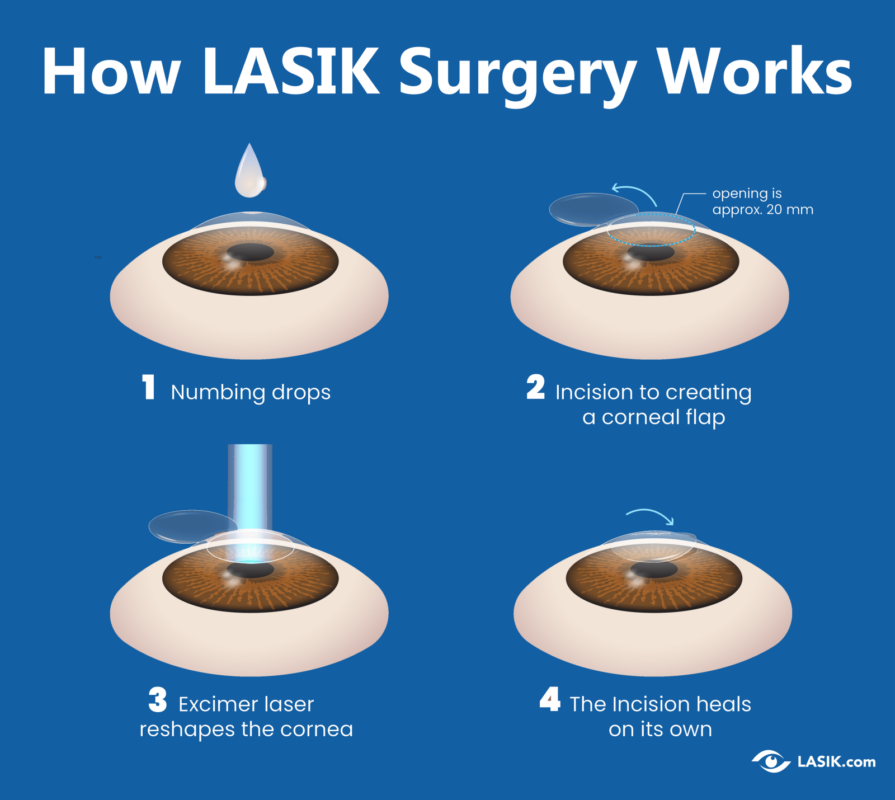Laser eye surgery has become an increasingly popular solution for individuals seeking to improve their vision without the need for glasses or contact lenses. While it has helped many achieve clear and sharp eyesight, it’s important to understand that like any medical procedure, laser eye surgery comes with its own set of risks and considerations. In this article, we will explore the potential risks linked with laser eye surgery, making sure you are well-informed before you decide about this life-changing procedure.

Introduction to laser eye surgery risks
Laser eye surgery, which is also referred to as refractive surgery, aims to reshape the cornea – the clear front surface of the eye – in order to address vision issues like nearsightedness, farsightedness, and astigmatism. Despite its high success rate, the procedure comes with potential risks.
Understanding Laser Eye Surgery risks:
Laser eye surgery employs advanced laser technology to precisely reshape the cornea. By altering its curvature, light entering the eye can be accurately focused onto the retina, improving vision clarity.
Common Types of Laser Eye Surgery:
LASIK (Laser-Assisted In Situ Keratomileusis) :
LASIK is the most common form of laser eye surgery. It involves creating a thin flap on the cornea’s surface, lifting it, and then reshaping the underlying tissue with a laser. The flap is then repositioned.
PRK (Photorefractive Keratectomy)
Another procedure called PRK involves removing the outer layer of the cornea to access the tissue underneath. Unlike LASIK, it doesn’t create a corneal flap and is preferred for individuals with thinner corneas.
SMILE (Small Incision Lenticule Extraction)
The SMILE procedure involves creating a small lens-shaped piece of tissue within the cornea and removing it through a small incision. This method reduces the risk of corneal weakening.
Benefits of Laser Eye Surgery:
Laser eye surgery offers numerous benefits, including reduced dependence on glasses and contact lenses, improved quality of life, and enhanced self-confidence.
Understanding the Risks
While laser eye surgery has changed the lives of numerous individuals, being aware of the potential risks it carries is crucial.
1. Laser Eye Surgery Risks: Dry Eyes
After surgery, many patients go through a phase of temporary dryness in their eyes, which it is possible to manage using lubricating eye drops.In some cases, dry eyes may persist.
2. Undercorrection or Overcorrection
In certain cases, the procedure may not fully achieve the desired vision correction, resulting in undercorrection or overcorrection. Enhancement surgeries can often address this.
3. Visual Disturbances
Some patients report visual disturbances like halos, glare, and starbursts around lights, particularly at night. These effects usually diminish over time.
4. Glare, Halos, and Starbursts
Author Details:
Dr. Sushruth Appajigowda holds a prominent position as a Cornea, Cataract, Glaucoma, and LASIK Surgeon in Bangalore. He serves as the chief Cataract and Refractive surgeon at Vijaya Nethralaya Eye Hospital, Nagarbhavi Bangalore. Renowned as one of the finest LASIK surgeons nationwide, he brings with him over 12+ years of experience across multiple LASIK platforms, including ZEISS, ALCON, SCHWIND, AMO, and Bausch and Lomb. Having successfully conducted over 5000 LASIK procedures, Dr. Sushruth holds the title of a Certified Refractive Surgeon and a Fellow of the All India Collegium Of Ophthalmology. Furthermore, he stands as a distinguished speaker at various National and International Forums, using his expertise to guide you in selecting the most suitable procedure based on your health requirements.

Conclusion:
Laser eye surgery can be a life-changing procedure, offering freedom from glasses and contact lenses. However, understanding the potential risks and benefits is essential for making an informed decision. By choosing a skilled surgeon, following pre and post-operative instructions, and managing expectations, you can maximize the chances of a successful outcome.
FAQs:
Q1: Is laser eye surgery painful?
A1: The procedure itself is typically painless due to the use of anesthetic eye drops. During the initial recovery period, you may experience some discomfort or mild pain.
Q2: How long does the recovery process take?
A2: While most patients experience improved vision within a few days, it can take several weeks for vision to stabilize completely.
Q3: Can the treatment for both eyes occur on the same day?
A3: Yes, many surgeons perform laser eye surgery on both eyes during the same session for convenience and consistency.
Q4: Are there any age restrictions for the surgery?
A4: Most individuals over 18 years old with stable vision prescriptions are eligible. However, a thorough consultation with a surgeon is necessary to determine candidacy.
Q5: Are the results permanent?
A5: The results of laser eye surgery are generally permanent, but age-related vision changes may occur later in life.











